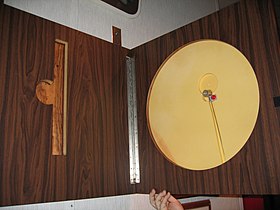Peter Wright (MI5 officer)
Wright determined that the bugging device, dubbed The Thing, was actually a tiny capacitive membrane (a condenser microphone) that became active only when 330 MHz microwaves were beamed to it from a remote transmitter.According to his memoirs, he then was either responsible for, or intimately involved with, the development of some of the basic methods of ELINT, for example: Wright worked as the first chairman of the new Radio Operations Committee (ROC) when it was formed in 1960.[5] With like-minded MI5 officers, Wright became alert to the fact that some senior figures in the intelligence services, in politics, and in the trade unions had been recruited long ago as Soviet agents.Gouzenko had provided Hollis with clear information about Alan Nunn May's meetings with his Soviet handlers and noted that the man who met him seemed to be in disguise, not interested in his revelations, and discouraged him from further disclosures.Gouzenko had not known about Klaus Fuchs, but he had named a low level suspected GRU agent, Israel Halperin, a mathematician who was later completely cleared of any suspicions of espionage.[10] Wright's investigation was also focused on Labour prime minister Harold Wilson, suspicions about whom were initially triggered amongst the MI5 leadership by James Jesus Angleton, chief of counterintelligence for the CIA.Dame Stella Rimington, MI5 Director-General from 1992 to 1996, later wrote in 2001 that she believed that in a Panorama programme in 1988, Wright had retracted an allegation made in his book about the MI5 group of thirty officers who plotted to overthrow Wilson's government.[11] Wright's case against Hollis was re-stated by Chapman Pincher[12] in his book, Treachery: Betrayals, Blunders, and Cover-ups: Six Decades of Espionage Against America and Great Britain (2009).[22] A memorandum prepared by the Department of the Prime Minister and Cabinet said among other things: ″The British are seeking to avoid discussion of any of Wright's specific allegations, arguing that, for the purposes of the trial, they can all be assumed to be true and even then Wright's breach of confidentiality would be a breach of contract and inequitable.″[22] In the opinion of the official historian of MI5, Christopher Andrew, Turnbull's ″brilliant″ conduct of the Spycatcher case humiliated the British establishment and triggered much-needed reform in the intelligence services.
ChesterfieldDerbyshireCygnet, TasmaniaSt Peter's College, Oxfordcounter-intelligenceSpycatcherPaul GreengrasscounterespionageJames Jesus AngletonCentral Intelligence AgencyMarconi Companysignals intelligenceFirst World WarBishop's Stortford Collegeindependentboarding schoolBishop's StortfordHertfordshireSt Peter's CollegeOxfordThe ThingNational Cryptologic MuseumSecond World WarAdmiraltycovert listening deviceGreat Seal of the United StatesMoscowYoung Pioneer organization of the Soviet UnionSovietLéon Thereminacoustic cryptanalysisHagelincipher machinesOperation RAFTERtelevision licencescompromising emanationLondonforeign intelligenceAnthony BluntCambridge FiveHarold Wilson conspiracy theoriesleft-winghomosexualOxford and CambridgeCambridge ApostlesKim Philbydefectionfifth manRoger HollisGordon LonsdaleClaud CockburncommunistAgnes SmedleyspymasterRichard SorgedebriefingsIgor GouzenkoAlan Nunn MayKlaus FuchsIsrael HalperinmathematicianRoyal Canadian Mounted PoliceHarry Golddouble agentKonstantin VolkovDirector-GeneralMartin Furnival JonesMichael HanleyBurke TrendPrime MinisterMargaret ThatcherSir Dennis ProctorMinistry of PowerGuy BurgessLabourHarold WilsonStella RimingtonPanoramaChapman PincherobituaryThe TimespensionCygnetTasmaniaVictor Rothschild, 3rd Baron RothschildroyaltiesHeinemannSupreme Court of New South WalesMalcolm Turnbullprime minister of AustraliaRobert ArmstrongappealsHigh Court of AustraliaBob HawkememorandumChristopher Andrewofficial secrets legislation of 1989European Court of Human Rightsfreedom of speechspy thrillerThe IndependentJulia PirieThe London GazetteThe GuardianDavies, NickThe London Daily NewsNick DaviesLos Angeles TimesAssociated PressEncyclopædia Britannica Bibliothèque nationale de FrancePincher, ChapmanWest, Nigel